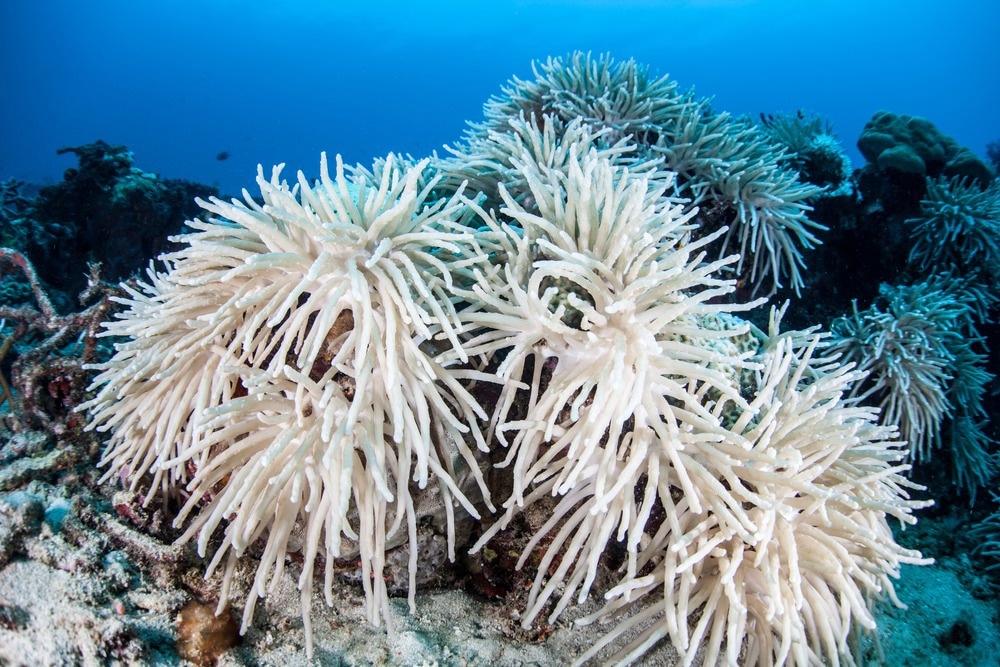A recent study sheds light on the function of microbes and how they combine to cause interspecific variations in coral thermal bleaching. The study was published in the American Society for Microbiology’s journal, Applied and Environmental Microbiology.

Image Credit: Ethan Daniels/Shutterstock.com
The diversity, community dynamic and interaction of coral associated microorganisms play important roles in the health state and climate change response pattern of coral reefs. We urge the creation of more expansive coral reef microbial datasets on a global scale and recommend undertaking interdisciplinary research encompassing ecology, marine chemistry, physical oceanography and microbiomics.
Biao Chen, Study Lead Author and Assistant Professor, Coral Reef Research Center of China, School of Marine Science, Guangxi University
The purpose of creating the databases, according to the researchers, is to highlight the critical role that microorganisms play in coral reef ecosystems’ ability to adapt to the challenges caused by global warming.
The effects of global warming have resulted in major biodiversity losses and coral thermal bleaching in reef ecosystems. Coral reefs, also known as coral holobionts, are made up of animal hosts, endosymbiotic Symbiodiniaceae (the marine dinoflagellate family), bacteria, archaea, fungi, and viruses.
During heatwave occurrences, corals have demonstrated considerable interspecific variability in the degree of bleaching and heat tolerance. The interactions between fungi and Symbiodiniaceae on variations in coral heat tolerance remain unknown, even though researchers are aware that the coral-associated microbiome is critical in controlling the environmental tolerance of coral reefs.
Chen set out to explore Huangyan Island, a reef in the South China Sea with a heightened risk of coral bleaching, to close this information gap. This choice was made on purpose since, at the same latitude as the Xisha Islands, the coral reefs surrounding Huangyan Island have noticeably warmer sea surfaces.
The 18 coral species the researchers focused on are widely dispersed throughout the South China Sea's tropical areas. Their study concentrated on determining the extent of bleaching during the notable coral bleaching event that took place there in 2020. A ranking system for these 18 coral species’ vulnerability to heat bleaching was developed as a result of this investigation.
In the third step of the study, the researchers looked at the dynamic interactions between coral organisms, especially the Symbiodiniaceae and fungi communities. They discovered possible links between ecological indicators of Symbiodiniaceae and fungal communities and the susceptibility ranking of coral heat bleaching.
According to the study, the heat-tolerant Symbiodiniaceae dominated the microbial community of corals on Huangyan Island. Increased fungal diversity and pathogen abundance are closely associated with increased coral thermal bleaching susceptibility.
The researchers created an interaction network between Symbiodiniaceae and fungi in corals, indicating that limiting fungal parasitism and ensuring robust interaction network resilience will increase coral heat acclimatization.
Chen added, “Our study highlights the ecological effects of microbiome dynamics and interactions between Symbiodiniaceae and fungi on coral thermal bleaching susceptibility, providing insights into the role of microorganisms and their interaction as drivers of interspecific differences in coral thermal bleaching. The study is poised to establish a preliminary groundwork for delving into the response patterns of coral-associated microorganisms to global warming.”
Journal Reference:
Chen, B., et. al. (2024) The microbiome dynamics and interaction of endosymbiotic Symbiodiniaceae and fungi are associated with thermal bleaching susceptibility of coral holobionts. Applied and Environmental Microbiology. doi:10.1128/aem.01939-23